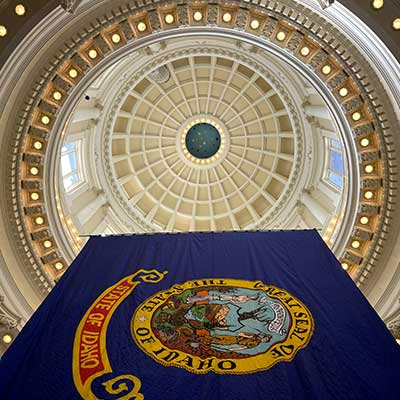Several bills of interest to Idaho Education Association members, including two highly anticipated voucher bills and a rework of legislation banning certain flags in classrooms, were introduced in legislative committees this week.
These bills are expected to have public hearings in committee next week.
“Now that we are in the fourth week of the Legislative session, the pace is beginning to pick up,” said IEA Political Director Chris Parri. “We’ll likely be seeing committees considering several bills a week from here on out.”
Two Anticipated Voucher Bills Introduced
Two voucher bills that Statehouse watchers have been waiting for were finally introduced on Wednesday — one in the House of Representatives and one in the Senate. The bills are set to compete for the support of Gov. Brad Little, who has signaled his willingness to sign voucher legislation, but only with accountability standards for how the money is spent similar to those faced by public schools.
Idaho Education Association members are opposed to vouchers in all forms. During a Monday press conference held during IEA’s annual Lobby Day, IEA stood with representatives from the Idaho School Boards Association and the Idaho Association of School Administrators in calling on lawmakers to reject vouchers.
“Vouchers come in many forms and go by many names — school choice, tax credits, education savings accounts. But in the end, they all achieve the same sad scheme: taking resources that should be invested in our public schools to provide subsidies for private school education,” IEA Executive Director Paul Stark said.
The ‘House Bill’
In the House, Rep. Wendy Horman (R-Idaho Falls) and Sen. Lori Den Hartog (R-Meridian) introduced their $50 million voucher offering a refundable tax credit for private school and home school expenses. The two prominent lawmakers — Horman is co-chair of the Legislature’s powerful budget committee and Den Hartog is the Senate Majority Leader — have made bringing vouchers to Idaho the center of their focus as lawmakers and have teamed up on similar legislation in the past.
House Majority Leader Jason Monks, R-Meridian, and Sen. C. Scott Grow, R-Eagle, are also listed as co-sponsors on the bill.
Horman has called vouchers “the civil rights issue of our time” and previewed this bill the first day of the session during a pro-voucher forum hosted the Mountain States Policy Center featuring former Arizona Gov. Doug Ducey. Ducey is responsible for his state’s universal voucher program, which is notorious for exploding Arizona’s budget deficit.
The legislation, introduced in the House Revenue and Taxation Committee, allows non-public school students to receive $5,000 in public tax dollars to pay for private school tuition, tutoring, curriculum and other private education expenses. While Horman claims the bill is intended to help less affluent Idaho families access a private education, the legislation allows families earning up to 300 percent the federal poverty limit — $93,600 annually for a family of four — to apply for the funds. Students with special needs could qualify for up to $7,500.
Horman tried to explain away her bill’s lack of accountability for how the voucher funds will be spent by families — something pro-voucher advocates crave — by calling the public education system a “government monopoly” that must be regulated “differently than you regulate the free market.”
The ‘Senate Bill’
In the Senate Education Committee, Chairman Dave Lent (R-Idaho Falls) introduced voucher legislation that would piggyback on the state’s existing Empowering Parents education grant program. Private school tuition was explicitly excluded from the grant program when the program was created in 2022.
Lent’s bill proposes eliminating this restriction and raising grant amounts from $1,000 to $5,000 per child. Households with multiple children could qualify for up to $15,000. Additionally, the bill seeks to boost the program’s annual funding from $30 million to $50 million.
Families with an adjusted gross income below $60,000 will be given first preference for receiving funding, while households with AGIs below $75,000 will receive second preference. Any money remaining in the program after that will be distributed on a first-come, first-served basis. A family can receive up to $5,000 per student, but the subsidies would be capped at $15,000 per household.
Additionally, Lent’s legislation offers a litany of accountability measures for the families and schools receiving the voucher fund, as well as administration responsibilities for the Idaho State Board of Education
To participate, parents must agree to use grant funds only for approved educational expenses. Misuse of funds results in disqualification from future applications, with an option to appeal, and the voucher must be used within three years or returned to the program fund.
The program would be overseen by a panel of seven parents appointed by the governor, senate president, and house speaker to advise the SBOE on program improvements and appeals.
Schools that receive money from the program must comply with state laws related to special education, nondiscrimination and parental rights, must maintain student enrollment and performance data and must administer standardized tests. Criminal background checks would be mandatory for any employee who has unsupervised contact with students.
Flag Bill Redux
Rep. Ted Hill (R-Eagle) has reworked and reintroduced legislation banning only a few select flags from Idaho classrooms after earning the House Education Committee’s endorsement of the earlier version last week.
The new bill, House Bill 41, attempts to clarify an exemption that flags of recognized foreign nations are allowed as long as they are not “hostile” to the United States. Local school boards would be responsible for determining which flags would be prohibited.
The panel’s only two Democrats opposed reintroducing the bill. Last week, the committee endorsed the previous version of Hill’s bill despite some confusion about which flags would be allowed and which would not.
During the public hearing on the earlier bill, Hill admitted he was spurred to write the legislation after seeing an educator displaying an LBGTQ+ pride flag during an online class.
The committee will likely have a public hearing on the new bill in the next week or so.
Bill Requiring Parental Notification of Bullying Resurfaces
Legislation requiring parents to be notified about instances of bullying at school was endorsed by the House Education Committee on Wednesday.
House Bill 44, sponsored by Rep. Chris Mathias (D-Boise), is similar to legislation narrowly rejected by the full House of Representatives in 2024.
Under the legislation, parents of both victims and aggressors are required to be notified of bullying incidents when suspension is warranted.




